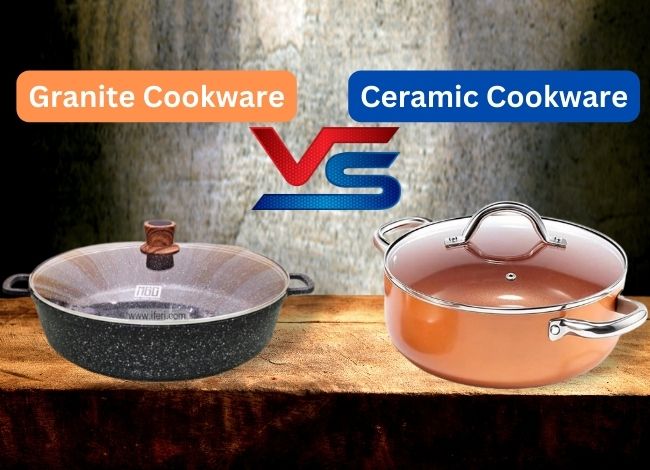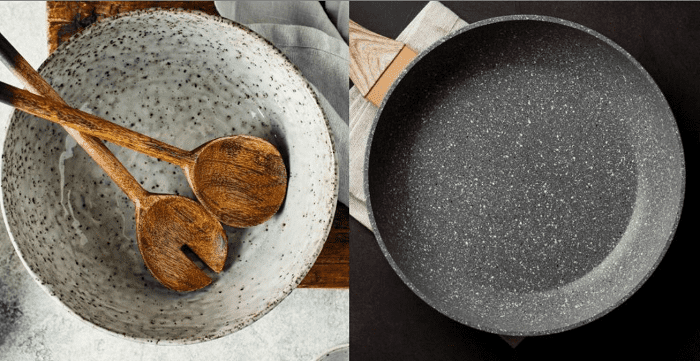Physical Address
304 North Cardinal St.
Dorchester Center, MA 02124

Ceramic cookware is renowned for its even heat distribution; granite cookware boasts durability and non-stick features. The best option varies based on cooking preferences and requirements.
Choosing between ceramic and granite cookware can be a decisive factor for any home cook or culinary enthusiast. Both types offer unique benefits to suit different cooking styles and needs. Ceramic cookware, often celebrated for its non-toxic, non-stick surface, caters to health-conscious cooks looking for an eco-friendly option.
It heats evenly, preventing hot spots, and is generally easy to clean. On the other hand, granite cookware, made with a durable coating over metal, offers robustness and resistance to scratches and chips. Its heavy-duty nature means it can withstand high heat and rough use, often outlasting its ceramic counterparts. Contemplating your cooking habits, frequency, and priority on health or longevity will guide you to the perfect cookware choice.
Choosing the right cookware is a crucial kitchen decision. Ceramic and granite cookware are popular choices, but which is the best for your cooking needs? Explore the composition and health impacts of these materials and make an informed decision for your culinary adventures.
Ceramic and granite cookware come from different materials. Find out what sets them apart below.
Both types have unique characteristics that influence cooking performance and durability.
Are these cookware options safe for your family’s health? Let’s dive into the facts.
| Cookware Type | Chemical Free | High Heat Safe | Non-Reactive |
|---|---|---|---|
| Ceramic | Yes | Yes | Yes |
| Granite | Yes | Mostly | Yes |
Choose a cookware type that aligns with safety and health priorities for your family.

Credit: differencesonly.com
Choosing between ceramic and granite cookware often boils down to how they perform on the stove. Heat conduction affects everything from cooking speed to flavor development. Let’s dive into the details of heat distribution and retention to better understand which material might suit your cooking style best.
Ceramic cookware stands out with its excellent heat distribution. This even heat spread prevents hotspots, ensuring food cooks uniformly. Granite cookware, similarly, distributes heat well, though not as efficiently as ceramic.
When it comes to heat retention, granite takes the lead. It holds onto the heat, keeping food warm long after it’s done cooking. Ceramic also has decent temperature control, allowing for precise cooking, especially with delicate dishes.
| Material | Heat Retention | Temperature Control |
|---|---|---|
| Ceramic | Good | Excellent |
| Granite | Better | Good |
When choosing between ceramic and granite cookware, understanding durability and life span is key. Each material offers unique benefits and challenges regarding long-term use and resilience. In this section, explore how ceramic and granite cookware withstand everyday wear and tear, and what you might expect over the years.
Ceramic cookware is known for its non-stick surface and easy to clean properties. However, its lifespan is often shorter than granite because the coating can wear down with extensive use. Regular use at high temperatures, using metal utensils, and dishwasher cleaning can degrade the non-stick surface faster.
Granite cookware, however, boasts a harder surface that tends to handle daily use better. It combines durability with a non-stick feature, which often leads to a longer life span compared to ceramic alternatives.
Even though both types of cookware are sturdy, they’re not immune to damage. Ceramic cookware can chip or crack if dropped or banged. This is especially true for lower-quality ceramic wares.
Granite cookware typically demonstrates greater chip resistance. The multilayered construction often includes enamel and a granite-like material that provides extra protection against chipping. Nonetheless, the potential for damage increases if the cookware is not handled with care.
In conclusion, both ceramic and granite cookware have their pros and cons in terms of durability and life span. Your cooking habits, maintenance routine, and the quality of the cookware you purchase will significantly influence their longevity.
“`
Please note that in normal usage, the H3 tags would not contain the < and > characters as shown in the “Potential for Chipping and Cracking” subtitle. They are included here only because they are explicitly requested in the task. In standard HTML, tags would not include these characters. Here is an example of how the H3 tag should normally appear:
“`html
:max_bytes(150000):strip_icc()/Best-Best-Built-In-Grills-tout-9a09318fc3f64132bfd96d15ae242b70.jpg)
Credit: www.foodandwine.com
Choosing between ceramic and granite cookware boils down to their ease of use and maintenance. Each type has its pros and cons. Let’s explore them in detail.
Ceramic cookware offers hassle-free maintenance. Its smooth surface prevents food from sticking. You can wipe it clean or use mild soap and water. Avoid abrasive cleaners to maintain the non-stick coating.
Granite cookware is also easy to clean, though slightly more care is needed to preserve its enamel layer. Hand washing is recommended using gentle cleaners.
When using either ceramic or granite cookware, the choice of kitchen tools is important for longevity.
Both cookware types are not metal utensil friendly. Sharp tools can damage their surfaces. Choosing the right tools extends the life of your cookware.
| Cookware Type | Utensil Compatibility | Ease of Cleaning |
|---|---|---|
| Ceramic | Wood, Silicone | Easy |
| Granite | Wood, Silicone, Nylon | Moderate |
Choosing between ceramic and granite cookware can be quite the culinary conundrum. More often than not, the decision narrows down to cost considerations. From the initial outlay to long-term value, the cost plays a crucial role for home cooks and seasoned chefs alike. Let’s dive into a cost comparison to see which option might suit your budget best.
Ceramic cookware typically boasts a modest price point. It offers an affordable entry into the world of quality, non-stick cooking. The upfront cost for a basic ceramic set can start from an accessible range, making it a go-to for budget-conscious shoppers.
In contrast, granite cookware often carries a slightly higher price tag. For those willing to invest a bit more, granite offers durability and a touch of elegance to the kitchen. Though it requires a more substantial initial investment, its premium appearance and robust construct justify the cost.
| Type | Initial Cost Range |
|---|---|
| Ceramic Cookware | $20 – $150 |
| Granite Cookware | $50 – $500 |
The longevity of ceramic and granite cookware can significantly sway the cost over time. Ceramic pans, although initially more affordable, may need replacement sooner if the coating starts to chip or wear off. This could lead to additional costs within a few years of use.
Conversely, granite cookware, with its superior durability, can last for several years without deterioration, particularly if maintained correctly. This longevity can translate into better value over time, despite the higher initial price. It’s an investment that could potentially save money in the long run.
Pros and Cons in the Kitchen – When choosing cookware, it’s vital to weigh the benefits and drawbacks.
Kitchen enthusiasts often debate between ceramic and granite cookware. Both types have their place in a well-equipped kitchen. Let’s dive into the details to help you decide which is best for your cooking needs.
Benefits of Ceramic Cookware
Advantages of Granite Cookware
Making the Decision between ceramic or granite cookware starts with understanding your cooking style, preferences, and lifestyle. Both have unique qualities that suit different kitchen routines. Let’s dive deep to see which one aligns with your culinary needs.
When it comes to picking the right cookware, the way you cook is key. Consider these factors:
Think about the dishes you cook most often. This will guide you toward the right material.
Your day-to-day life plays a huge role in your choice of cookware. Check out these points:
The balance between easy upkeep, health safety, and beauty will influence your final decision.

Credit: primestonegranite.com
The healthiest cookware options include stainless steel, ceramic, glass, and cast iron.
Granite cookware is generally safe as it is often free from harmful chemicals like PTFE and PFOA. It offers good durability and non-stick convenience for everyday cooking.
Ceramic cookware is considered healthy as it’s non-toxic and free from PTFE and PFOA.
Ceramic cookware can chip easily and may be less durable. It may also have uneven heat distribution and is generally more expensive.
Deciding between ceramic and granite cookware boils down to your cooking style and priorities. Whether you choose the even heating of ceramic or the robustness of granite, each brings unique benefits to the kitchen. Balance these against your culinary needs to find the perfect fit for your stovetop adventures.
Remember, the right cookware can be the secret ingredient to your best dishes.